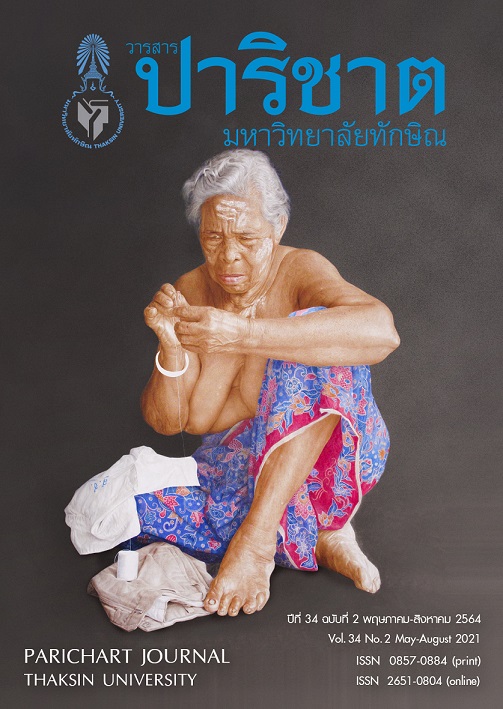Creating Social Innovations through Participatory Process to Solve Local Problems: A Case Study of Beuangkrajub Sub-District, Wichianburi District, Phetchaboon Province
Main Article Content
Abstract
This research article considerably emphasized participation of various sectors in locality. The main objective of the study was to create social innovations that could be used to solve local problems. In this participatory research, four research instruments were used: 1) evaluation on dissatisfaction towards public service, 2) people’s scorecard 3) budget literacy and 4) concrete action to resolve local problems. The results from the evaluation on dissatisfaction towards public service and the people’s scorecard showed that people most needed the problem of land ownership in Khokprue Pasture to be solved. Additionally, by processing the budget literacy and the concrete action to resolve local problems processing, four social innovations was identified to solve land problems, which included 1) land ownership management practices, 2) establishment of the land management committee, 3) establishing a land management fund, and 4) granting consideration system for new ownership in Khokprue Pasture. This research suggests that the four research tools could be adapted for use in other areas to support the public services of government agencies more efficiently and support the promotion of democracy in Thailand.
Article Details
References
Office of the National Economic and Social Development Council. (2019). Retrieved August 1, 2020, from http://www.social.nesdc.go.th/.
Pramanmuang, U. (2013). Factors Related to Exercise Behaviors of Village Health Volunteers of Bung-Krajab Sub-District, Wichian Buri District, Phetchabun Province (Master thesis). Bangkok: Kasatsart University. (in Thai).
Kinyashi, G. (2006). Towards Genuine Participation for the Poor. Tanzania. Spring.
Jones, S. J., Miller, R. L., & Luckey, I. (2013). Action Research, An Intervention for Change, Development, and Advocacy in a Global society. In R.L. Miller, A. E. Fortune, & W. J. Reid (Eds.). Qualitative Research in Social Work (2 nd ed.). (pp. 213-237). New York: Columbia University Press.
Nhamo, G. (2012). Participatory Action Research as a Platform for Community Engagement in Higher Education. Journal of Higher Education in Africa, 10(1), 1-21.
Miller, M. L. (2004). Domination & Dissatisfaction: Prosecutors as Sentencers. Stanford Law Review, 56(5), 1211-1269.
McKenzie, J. F. (2015). An Introduction to Community and Public Health. Burlington, MA: Jones & Bartlett Learning.
Masiya, T., Davids, Y. D., & Mangai, M. S. (2019). Assessing Service Delivery Public Perception of Municipal Service Delivery in South Africa Theoretical and Empirical Researches. Urban Management, 14(2), 20-40.
Hand, D. J., & Adams, N. M. (2014). Selection Bias in Credit Scorecard Evaluation. The Journal of the Operational Research Society, 65, 408-415.
Rosenbloom, D. H. (2007). Reinventing Edministrative Prescriptions: The Case for Democratic-Constitutional Impact Statements and Scorecards. Public Administration Review, 67, 28-39.
Lorsuwannarat, T. (2003). Budget Reform in Thailand: A Case Study of Budget Preparation for 2003 Fiscal Year. Bangkok: Satfo Printing. (in Thai).
Caernarven-Smith, P. (1990). What Your Budget Khows about You. Technical Communication, 37(1), 74-77.
Thomson, M. (2003). Improving Defence Budget Transparency, in the Cost of Defence ASPI Defence Budget Brief 2003–2004. Australian Strategic Policy Institute.
Haines, D. W. (2017). An Introduction to Sociocultural Anthropology: Adaptations, Structures, Meanings. Boulder: University Press of Colorado.
Beresford, P., et al. (2011). Participation, in Supporting People. Bristol University Press.
Franks, P., Booker, F., & Roe, D. (2018). Understanding and Assessing Equity in Protected Area Conservation, a Matter of Governance, Rights, Social Impacts and Human Wellbeing. N.P.: International Institute for Environment and Development.
Suksawas, W. (2017). Social Capital and Self-Management Charter. Journal of Community Development Research (Humanities and Social Sciences), 10(2), 91-106. (in Thai).
Grönlund, K., & Setälä, M. (2007). Political Trust, Satisfaction and Voter Turnout. Comparative European Politics, 5(4), 400-422.


